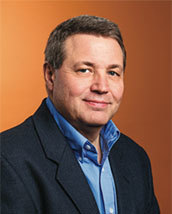A lasting legacy
Ten years ago this month, the nation was still reeling from the devastation wrought by Hurricane Katrina. A full month after the storm struck New Orleans, relief efforts were still far from adequate. It was not a lack of generosity, as people from around the world poured millions of dollars into relief efforts. The failure was in getting supplies to where they were needed most.
Logistics professionals gathering in San Diego for the Council of Supply Chain Management Professionals' (CSCMP) annual conference that October recognized that the supply chain for the Katrina response was broken. Both federal and private efforts had failed to keep up with demand. In many places, roads were still impassable, and the situation was becoming grim. As one speaker at the conference noted, the supply chain professionals in the room could "get trinkets wherever we want, but we can't get food to the Superdome."
It was during that meeting that outgoing CSCMP president Mark Richards invited interested professionals to gather for a discussion on how members could lend their collective expertise to the cause. From that initial gathering in San Diego, the American Logistics Aid Network, better known as ALAN, was born.
Under the guidance of its founding president, the late Jock Menzies, ALAN brought together the logistics community, government agencies, and nonprofit aid organizations to resolve critical supply chain issues, so that relief efforts can be mounted quickly. Menzies was famous for stating, "The magnitude of a disaster is predicated on the success or failure of the supply chain."
Today, 23 key supply chain trade and professional organizations have joined ALAN's network of support, uniting supply chains for humanitarian response whenever and wherever needed. "Our secret sauce is really just connecting people," says Kathy Fulton, ALAN's executive director.
From the destruction of Hurricane Sandy, to the devastation of the Haitian earthquake, to the Ebola outbreak in West Africa, ALAN has been there to serve as a bridge between the private sector and disaster responders, helping to coordinate the swift delivery of much-needed food and supplies to ease the hurting.
In addition to disaster response, ALAN also provides educational programs and logistics support for ongoing developmental work around the world. Future plans call for building the kinds of networks that have succeeded nationally and internationally on the local level. Such local connections will greatly shorten response times whenever a crisis occurs.
We at DC Velocity salute those men and women who 10 years ago stepped up for good. And we urge those not yet involved in ALAN to offer your own expertise and resources as well. Visit alanaid.org to learn more.
Related Articles

Copyright ©2024. All Rights ReservedDesign, CMS, Hosting & Web Development :: ePublishing